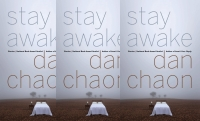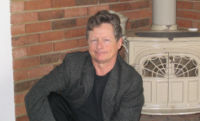A, B & E
1. What’s in store for 2010?
Shooting some videos of the book–voiced over by an actress, with some storyboarded prop action–should look a bit different from trailers/ authors reading with book in hand. Doing more live readings and hopefully connecting with the readers–the novel has a strong voice that I think lends itself to being vocalised. And then hopefully getting back to my work in progress interrupted by all this promo work…
2. What can you tell us about A, B & E that maybe isn’t in the publisher summary, what do readers need to know?
That the book tips its hat back in the direction of the literary modernists, in terms of its experimentation with narrative form and its delight in language. If you, gentle reader, are thirsting in your next read for something a bit different, a bit challenging, may I humbly suggest you wrestle with A, B & E…
3. From the outset it is apparent you are playing with language in the story, and in reading through your website and blog posts, you have some big ideas behind this. Do you feel you succeeded…what did you learn?
To me language is slippery and evasive–I started out writing stage plays where it’s all about what is not said–so the first quest is to nail down precisely the meaning I’m after. Secondly all existence is mediated through language, in that the consensus we take for what we call reality, is constructed through the names given to things to help order our perception. But my interest comes in the fact that the names given to things, and language as a whole, is not random or neutral. They reflect the power relations between things and I am keen to strip away the surface beneath the word to maybe examine what lies beneath. You can have a dining table with a dinner party sat around it, a coffee table with no other function than as an aesthetic in a room, a dissection table, a pool table with hustlers; then you can have things that aren’t tables but share the same function, such as a soldier eating his rations off an upturned ammunition case, or a flat pack table sat in a warehouse, that is a table, yet not a functioning one and so on. Each offers very different contexts for the single word table. The differing arrangements of people and objects in relation to the table change the mood of its basic function. Have I succeeded? It’s an ongoing project. Language is forever mutating, new word usages and idioms coming in all the time. That’s why I veer violently between formal and vernacular language, sometimes mid sentence! That’s where the sound and rhythm of sentences come into play for me as a writer. And finally, there is great opportunity to play with language when it’s set down in print. Wordplay and puns and echoes of words within other words. The possibilities are endless and keep things fresh.
4. Your leads are a gangster’s moll and a nurse, can you tell why you selected two such disparate types without spoiling anything?
The moll is, by dint of the world she moves in, very masculinised. She has status as the other wives have to defer to her as wife of the top man, but she has no real power because ultimately that rests with the men and their violent souls. The nurse however is the epitome of femininity, embodying a spectrum of male fantasy. From virginal angel, through mother-carer, to sexually provocative vamp. This particular nurse asserts her power in trying to deny all these various projections put upon her. Both are determined to some extent by their position in society and both kick against such shackling. With what success? Ah, that would be telling!
5. Something that interests me is that one of your lead characters seeks refuge in the party scene in Europe, a cultural sideshow that many claim to find repellent, which is disproved by the popularity of TMZ.Com, most of MTV’s programming slate, etc. What was your intent in sending the character there?
She has an image of Classical Greece which leads her to imagine she has a potential emotional tie with the place which is why she opts to take her exile there. When she lands, she finds herself among a community of her fellow nationals who have a very different image of the place. Among such hedonists she comes to see that in a way, their unalloyed quest for pleasure has been serviced by the likes of her gangster husband, providing the drugs and the doormen for clubs. That through her own moral myopia, she effectively not just suckled these children without any stake in society, but actually gave birth to them. Trying to piece together her thoughts and her future in exile, while around her are those who just want to dance their lives away in a perpetual present. I actually watched a lot of those MTV programmes as my ‘research’! I watched appalled and rapt at the same time. My interest I guess is an exploration of the nature of pleasure in the 21st Century. Ask most people to define pleasure and how they might attain it and most would struggle I believe. Personally, I have an issue with the notion that any artificial substance is integral to pleasure, even as a facilitator. People should trust their own selves and their own abilities more. Even the perverse ones. Actually, especially the perverse ones.
6. In your noughties-summarizing blog post you listed much that you found problematic or which your are ambivalent regarding in the past decade—was there anything to commend in the previous ten years, or any looming developments for the decade ahead?
I see the Noughties as a complete void. There was nothing but drift and purposelessness. After the radical Conservatism of Margaret Thatcher (love her or hate her), Labour came into power with a huge mandate for change and proceeded to be too afraid to take any action at all in case they alienated their new supporters. Culturally we have replaced artistic vision with a desire for fame and celebrity just for its own sake (the so-called Young British Artists of Damien Hirst, Tracey Emin et al, were all about living their lifestyle in public, more celebrity and gossip pages than actual artistic merit). There is no public debate about anything in Britain. Everybody ploughs their own little acre of life, keeping their heads down, reading Harry Potter or Dan Brown and questioning nothing about their existence. We have all been infantilised, even as our children have been propelled headlong into premature adulthood, bombarded by consumer society’s aspirations and a globalisation of all culture. Enough smoke has been blown in people’s eyes about ecological arguments to preclude any meaningful debate. I have nothing to commend in the past decade and hold no great hope that the euphoria surrounding Obama’s election will yield anything of weight. And the next decade? Unless people start reflecting on the society around them, on their culture and what the nature of pleasure actually affords, then I only see more of the same. For my part I’m trying to shake the hive and rouse the bees to anger (only they’re all disappearing off the face of the planet as well).
7. Cultural commentators have it that reading and literature are in their death throes, which I think is at once a lie and rather misinformed. What must the literary community do to get the public-at-large past this misconception? Should we try, or let everyone catch up with us at their own pace?
I profess myself a non-expert in this debate. I do fear for the future of literacy if after their alphabet primer books, kids move straight on to digital reading. They will have missed out on that pure relationship of reading and bathing in the imagination, that the focused activity of reading a book in hand demands. Whereas reading from a screen is likely to be multi-tasking, along with listening to I-tunes, answering e-mails and checking out YouTube videos. What do writers have to do? Write better books. Books for the twenty-first century, not those stuck in a 200 year old art-form. If that calls for visual elements of design, or presentation media such as embedded video, then fine. But let it be the author’s creative choices, not the marketing department of publishers.
8. What can you tell us about your work with Year Zero Writers?
It’s such a delight because it’s so loose a grouping. I’ve only ever met one in the flesh and we’re spread all over the globe which makes for a great heterogeneity of styles. We share marketing, and increasingly as we get acquainted with each others’ work, we share writing and craft ideas – in my case there are great collaboration possibilities with visual artists, seeing as I struggle to draught a stickman on paper. Year Zero lets me post experimental stuff as I work out new narrative forms and test the reaction in readers, a showcase I just couldn’t get anywhere else. I guess I’m also the political wing of Year Zero–I contribute articles looking to tear down the sacred cows of literature and writing. To date I’ve thrown down the gauntlet on the centrality of story, on the use of dialogue and real life references. Guess which side I came down on regarding all three?
9. A writer or a text our readers should track down?
If you mean an already published writer, then my favourite comedic novel is “Karoo” by the late Steve Tesich which made me laugh out loud on virtually every page, which when reading silently to oneself is quite an achievement. As a text, I was really heartened by the new Nobel Laureate Herta Muller’s Nobel lecture, which offered up the centrality of words and language in European literature and which overnight made me realise in some ways I am closer to the European literary tradition than to a British one.
10. Seen any good movies lately?
I used to go to the movies a lot. It was an art-form I could actually enjoy without feeling I had a professional interest in it, since the scale was so far removed from my reality. When my twin boys came along, I knew I wouldn’t be getting out all that much in the early years and the only thing I dreaded giving up was the cinema. But in retrospect, I haven’t missed it at all. With satellite TV you get access to films that were released quite recently (I know it’s not the same as seeing it on a big screen). The last one I saw that was quite affecting was “The Baader Meinhoff Complex” and “Hunger” is quite extraordinary viewing.
Thanks for your time, Marc. Good luck with A, B & E!
Thank you. Really refreshing questions. More power to the elbow of Emprise.
–
Interviewed by Patrick McAllaster







